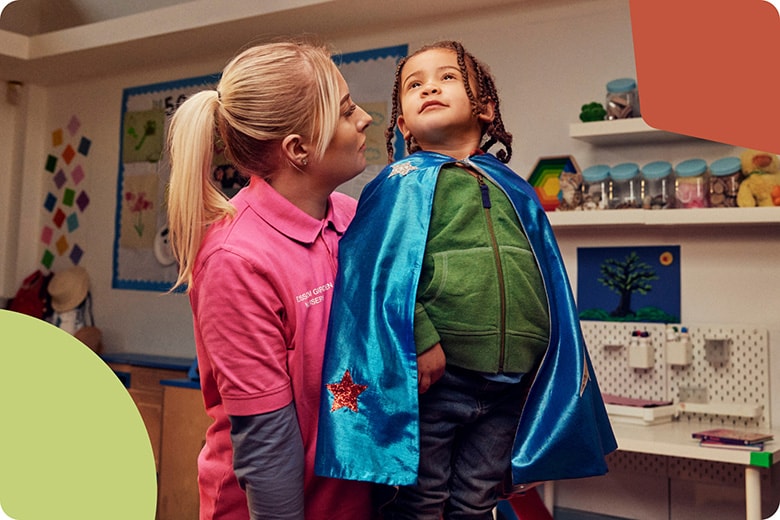Training and qualifications
You don’t need a qualification to start your career in early years and childcare but it’s something that nurseries and pre-schools often look for. Also, there are some roles where you will need to have an approved qualification.
Learning new skills and getting an approved qualification can help you to develop your knowledge and progress your career in early years and childcare. Take a look at the different ways to get started:
Apprenticeships: start work now and get a qualification on the job
Apprenticeships combine real work with training and study for a specific role. You’ll learn new skills, gain experience and earn a salary too. There are two entry-level early years apprenticeships:
- level 2 early years practitioner (equivalent to GCSEs)
- level 3 early years educator (equivalent to A Levels)
Find out more about these apprenticeships.
Both apprenticeships are suitable for those with no previous experience. Level 2 may be more suitable for those leaving school at 16. It allows you to work in an early years setting under supervision. It is an excellent entry point into the sector.
Level 3 may be more suitable for those who want to plan, organise and lead learning activities, and perhaps supervise others.
To work as a qualified member of staff, you’ll need to hold an approved qualification.
Become an Early Years Teacher
There are a few different ways you can train to become an early years teacher. You can:
- study for an undergraduate degree,
- take on an early years teacher degree apprenticeship,
- or choose a postgraduate option if you already have a degree.
All of these routes lead to Early Years Teacher Status (EYTS).
Here’s what you’ll need
To get started, you’ll need GCSEs in English, maths and science at grade C/4 or above (or equivalent).
If you’re not a UK citizen, you can still apply as long as you meet the academic entry criteria and immigration permissions for non-UK candidates.
If you don’t have GCSEs, you’ll need an equivalent qualification in English, maths and science.
If you’re applying for postgraduate training, you’ll need a bachelor’s degree or something equivalent – for example, a vocational or professional qualification, or a qualification gained outside the UK.
Your training options
There are four main routes into Early Years Initial Teacher Training (EYITT):
- Postgraduate training: for people with a degree who want to study full time to gain Early Years Teacher Status.
- Postgraduate employment-based training: a good option if you already work in an early years setting and want to earn while you work towards EYTS.
- Postgraduate assessment only: if you’re an experienced graduate who already meets the early years teachers’ standards, you might be able to achieve EYTS without additional training. This is a self-funded option.
- Undergraduate training: if you’re looking to study for a full-time degree, this route lets you gain a bachelor’s in an early childhood-related subject, and become an early years teacher (with EYTS) by the time you graduate.
What this qualification means for your career
Once you’re qualified, you can work as an early years teacher in:
- Private, voluntary and independent nurseries
- Independent school infant classes
- Nursery classes in academies and free schools
It’s also a great next step if you’re already working as a childminder or teaching assistant in a maintained nursery school or reception class.
This qualification opens up new opportunities, helps you build leadership skills, and boosts your career in the early years sector.
You’ll learn how to
- Plan and deliver great lessons
- Lead teams and work with families and other professionals
- Help run and improve an early years setting
Support and funding
There’s funding available for many of these routes, depending on your circumstances. You can read the full 2025 to 2026 funding guidance on GOV.UK.
Ready to apply?
You’ll need to apply directly through an accredited early years training provider. You can find a list of early years initial teacher training providers on GOV.UK.
Early Years Teacher Degree Apprenticeship (Level 6)
Train, work, and qualify as an Early Years Teacher with a Level 6 Degree Apprenticeship – no prior experience needed.
You can apply if you have
- GCSEs in English, maths, and science (grade C/4 or above)
- any Level 3 qualification (equivalent to an A Level)*
- lived in England for the last 3 years or more
If you do not have a GCSE in English or Maths, you might qualify for a free course to improve your skills to gain them.
*We recommend that trainees hold a Level 3 qualification to demonstrate a minimum level of educational attainment. However, if someone does not have this, they may be able to demonstrate equivalence through an appropriate assessment, at the discretion of training providers.
This apprenticeship is ideal for
- beginners with no experience – start your career in early years education
- current early years staff and childminders – gain a degree and Early Years Teacher Status while working
How this qualification helps your career
You’ll be qualified to work as an early years teacher in:
- Private, voluntary and independent nurseries
- Independent school infant classes
- Academy and free school nursery classes
It’s also a great fit for childminders, and can support you to assist in maintained nursery schools.
Whether you’re just starting out or already working in early years, this qualification gives your career a boost and unlocks new opportunities across the sector.
You’ll learn how to
- plan lessons and develop policies
- lead teams and work with families and agencies
- contribute to running an early years setting
Find out more
This new apprenticeship starts in 2026.
Get a qualification before starting work
If you want to gain a qualification through a classroom-based course, you can get approved qualifications through a range of training providers. These include:
- level 2 courses (equivalent to GCSEs)
- level 3 courses (equivalent to A Levels)
- the T Level in education and early years (broadly equivalent to three A Levels)
- early years degrees
To find out what training is available where you live, speak to your local college, training provider or careers service. If you decide to work towards a qualification, it’s important check if it is an approved qualification. Ask your training provider if the qualification:
- has been approved by the Department for Education
- will let you work as a level 2 or level 3 member of staff
You can get free level 3 early years qualifications if you:
- don’t already have a level 3 or higher qualification
- are unemployed or earning below the National Living Wage annually – this is regardless of any other qualifications you hold
You can also get free maths level 2 courses if you do not already have a GCSE in maths at grade 4 (or equivalent).
Already have a qualification
If you already have a qualification that you think might allow you to work in early years it is important to check if it is an approved qualification. Ask your training provider if the qualification:
- has been approved by the Department for Education
- will let you work as a level 2 or level 3 member of staff
If you are thinking of doing a course, speak to a training provider about recognition of prior learning. This means a training provider may offer to assess your prior learning to see whether they can credit you for learning you’ve already done. This could lead to you being able to complete a course more quickly.
Many training providers have their policies on recognising prior learning online. This will explain who is eligible, what evidence they need from you and how their process works.
Experience-based route for early years
The experience-based route for early years allows suitable staff to be included in the staff:child ratios at level 3 following a period of supervised practice. You may be eligible for this route if you hold either:
- A level 2 qualification that has been approved by the Department for Education as full and relevant; or
- A level 3 or above qualification that has not been approved by the Department for Education but is relevant to the care and education of children.
You must also have worked with early years children (aged 0-5) in an early years setting or related sector for at least one year.
The experience-based route is undertaken while working at an early years provider, and it is at the provider’s discretion whether they wish to offer this pathway to their staff.
If you are interested in this route, discuss this with your employer to understand if it is available at your early years setting and if you are eligible.
Free online training courses
Whether you are thinking of working with small children or even if you already are, there are courses available that can help you get one step ahead or brush up on your skills.
Early years child development training
There’s no experience required to take this free online early years child development course.
If you’re already working in early years, the course will build and strengthen your existing knowledge of child development.
If you’re just starting out, then it will give you invaluable new insights.
You can choose to do this online course whenever suits you and you’ll get a certificate for each module you complete.
Skills Bootcamps
Skills Bootcamps are free, flexible courses of up to 16 weeks.
They are perfect if you are looking to change careers or progress in your existing early years role.
Once you complete the Skills Bootcamp, you’ll have the opportunity to move into an accelerated level 3 early years educator apprenticeship.
Search for an early years educator Skills Bootcamp near you.
Other entry routes
Many employers welcome applications from people of all backgrounds and experiences. You may not need a qualification to join.
However, if you want to build on your skills and experience before you apply, you can also take a course.
Some courses will include work placements at a local nursery or school as part of the course.
If you want to work as a childminder, you’ll need relevant first aid and childcare training. Check what else you’ll need to become a childminder.
Search for jobs
If you’re ready to apply now, you can search for jobs in the early years and childcare sector. There are around 30,000 nurseries and pre-schools in the UK, so there are lots of opportunities out there.
Real stories
Explore our bank of inspiring case study videos and blogs from real early years educators.

Help and support
Not sure where to begin? Our support team is a great place to start.
